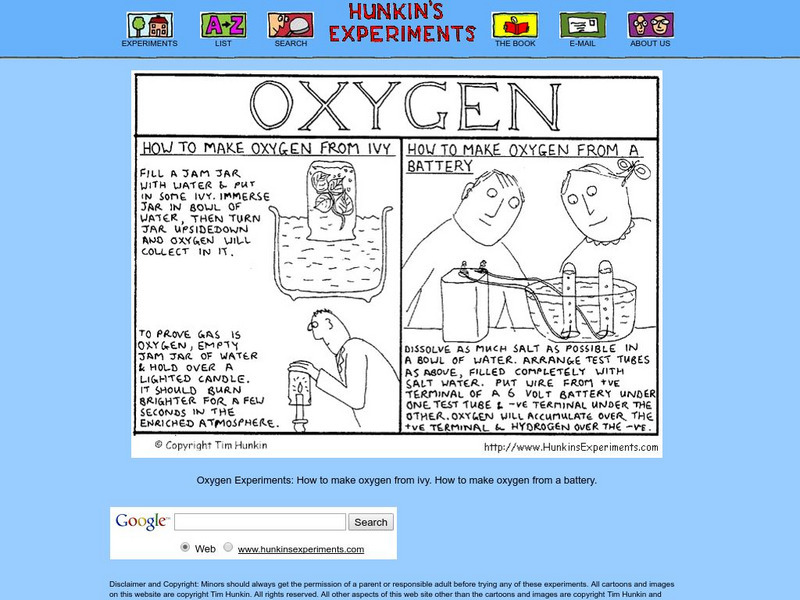American Chemical Society
Middle School Chemistry: Changing State Condensation
Explore the process of condensation as it pertains to molecular movement in water vapor.
American Chemical Society
Middle School Chemistry: Why Does Water Dissolve Sugar?
Explore this animation to learn why water dissolves sugar.
American Chemical Society
Middle School Chemistry: Temperature Changes in Dissolving
See how temperature changes affect dissolving and the molecular bonds in a water molecule.
American Chemical Society
Middle School Chemistry: Can Liquids Dissolve in Water?
Find out if liquids can dissolve in water.
American Chemical Society
Middle School Chemistry: Finding Volume the Water Displacement Method
Discover how water displacement can help scientists accurately measure volume.
American Chemical Society
Middle School Chemistry: Density of Water
Discover how the molecular make-up of water affects its density.
American Chemical Society
Middle School Chemistry: Water Is a Polar Molecule
Explore the water molecule, and understand how it is a polar molecule.
American Chemical Society
Middle School Chemistry: Why Does Water Dissolve Salt?
Explore this animation to learn why water dissolves salt.
American Chemical Society
Middle School Chemistry: Can Gases Dissolve in Water?
Use this interactive animation to find out about whether or not gases dissolving in water.
American Chemical Society
Middle School Chemistry: Co2 Reacting With Water
See how carbon dioxide reacts with water to produce carbonic acid.
Other
Beautiful Chemistry: Molecular Structures
These models show the structures of some basic molecules such as water and carbon dioxide, then move on to show more complex molecular strautures.
American Chemical Society
Middle School Chemistry: Temperature and Density
Learn how the molecular movement in different temperature water affects the density of the liquid.
American Chemical Society
Middle School Chemistry: Does Temperature Affect Dissolving?
Investigate the difference between the solubility of salt and sugar in hot and cold water.
American Chemical Society
Middle School Chemistry: Density Sink and Float for Liquids
See how different liquids can have different densities depending on their molecular make-up.
American Chemical Society
Middle School Chemistry: Energy Levels, Electrons, and Covalent Bonding
Discover how covalent molecular bonding affects the energy levels of electrons.
American Chemical Society
Middle School Chemistry: Changing State: Evaporation
Learn how substances change from a liquid to a gaseous state in the process of evaporation.
Other
University of Siegen: An Exothermic Reaction
The University of Siegen provides a lovely exothermic reaction shown by four large photos. Sodium peroxide and zinc powder with a touch of water.
American Chemical Society
Middle School Chemistry: Surface Tension
Explore the chemical properties involved in surface tension.
American Chemical Society
Middle School Chemistry: P H and Color Change
Learn about color change and pH as it relates to chemical changes.
Hunkins Experiments
Hunkin's Experiments: How to Make Oxygen From a Battery
Hunkin's Experiments is a group of simple cartoon illustrations of scientific principles. Some would work well in the classroom, but others have little value beyond entertaining students. All of the projects are easy to do. This one...
Curated OER
Science Kids: Science Images: Chromatography
This photo shows a completed chromatography chemistry experiment. The colors have clearly separated from each other along the piece of paper. The original black ink was separated using an ethanol and water mixture solvent.
Curated OER
Science Kids: Science Images: Hydrogen Bonds
A computer generated image showing a 3D model of hydrogen bonds in water.
Other popular searches
- Water Chemistry
- Lake Water Chemistry
- Water Chemistry Ions
- Co2 Water Chemistry
- Water Chemistry Lesson Plans
- Ocean Water Chemistry
- Basic Water Chemistry
- Water Chemistry Properties
- Storm Water Chemistry
- Marine Water Chemistry
- Size vs. Water Chemistry
- Water Chemistry Nitrate


